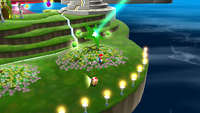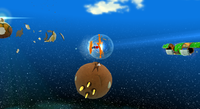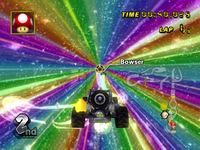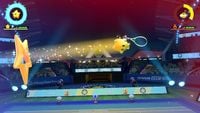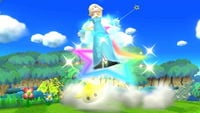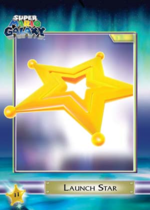Launch Star
- This article is about the object from the Super Mario Galaxy games. For Rosalina's up special move in the Super Smash Bros. series, see Launch Star (move).
| Launch Star | |||
|---|---|---|---|
 Artwork from Super Mario Galaxy | |||
| First appearance | Super Mario Galaxy (2007) | ||
| Latest appearance | Super Mario Galaxy + Super Mario Galaxy 2 (2025) | ||
| |||
- “I'm going to transform into a Launch Star. Come over and fly!”
- —Luma, Super Mario Galaxy 2
A Launch Star is an object that launches Mario or Luigi to different planets in outer space, introduced in Super Mario Galaxy. Launch Stars are large stars, usually colored orange, that hover just above the ground of a planet, though they can sometimes appear floating in the air above a planet, or just floating in space. Launch Stars have an outer ring that has orbs on their tips and an inner ring that pulls the user back before propelling them forward.
History[edit]
Super Mario series[edit]
Super Mario Galaxy[edit]
In Super Mario Galaxy and its Nintendo Switch port, the first time Mario uses a Launch Star, the path of the Launch Star is originally invisible, but it is traced out in space as Mario is flying to the next planet. However, if Mario later returns to a Launch Star that he has already used to travel to another planet, the path will be visible before he uses it.
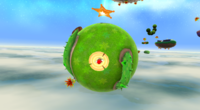
Launch Stars can be activated only by shaking the Wii Remote and causing Mario to spin when he is either in or next to a Launch Star, though any Launch Stars in the level visibly spin when the Wii Remote is shaken, regardless of whether or not he is necessarily close to one. When activated, a Launch Star catapults Mario to another planet or set of planets. When Mario stands directly under a Launch Star, the gravity of it pulls him into the center of it automatically. If the player does not shake the Wii Remote after a few seconds, the Launch Star will release Mario and he will touch down on the ground again.
Launch Stars are not always readily available for Mario to use. In some cases, Mario must complete a certain task or objective before the Launch Star appears, such as collecting five yellow Star Chips, eliminating all the enemies on a particular planet, or freeing a yellow Luma or the Launch Star itself from a crystal or a cage. In addition, yellow Lumas are also able to transform into Launch Stars independently, though this is more common in the game's sequel, Super Mario Galaxy 2 (the player usually has to free the Luma from a cage before it transforms into a Launch Star, though this is not always the case). It is revealed in this game that these Lumas still retain the ability to talk to Mario while in Launch Star form.
Launch Stars often let Mario fly through space for a short time before landing on another planet, unlike their smaller related items, Sling Stars, which often fling Mario directly to another planet, with very little space in between. While flying through space, Mario occasionally hits a floating giant Star Bit that has been placed directly in the path of the Launch Star, and it often releases multiple Star Bits that float around Mario until he lands on the planet. Mario can collect these Star Bits when the player touches them with the Star Pointer.
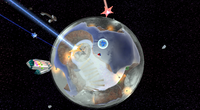
After Mario feeds a Hungry Luma, it transforms into a new planet or galaxy and leaves behind a pink Launch Star leading to that planet. The only Hungry Luma that does not leave behind a Launch Star after being fed is the one that transforms into the Hurry-Scurry Planet in the Sea Slide Galaxy (Mario must use a cannon to reach the planet instead).
A green Launch Star that takes Mario to the Planet of Trials when activated is located onboard the Comet Observatory. This one plus the four Launch Stars on the Planet of Trials are the only green Launch Stars in the entire game.
Super Mario Galaxy 2[edit]
In Super Mario Galaxy 2, Launch Stars function identically as in Super Mario Galaxy. The path of each Launch Star that Mario uses appears before he uses it for the first time, as well as each time he uses it following the first time. One exception to this is in the Grandmaster Galaxy, where no path is projected.
Mario Kart Wii[edit]
In Mario Kart Wii, a single large Launch Star appears in Rainbow Road, where it acts as a cannon and shoots racers into a rainbow tunnel and through another large Launch Star at the end (the second Launch Star does not launch racers). The design of the railings of this course also has multiple Launch Stars on it.
Although Launch Stars do not appear in future Mario Kart games, the Star Rings on various Rainbow Roads resemble Launch Stars. The Launch Star pattern on the railings of Mario Kart Wii's Rainbow Road returns in the course's reappearances in Mario Kart Tour and Mario Kart 8 Deluxe; however, the Launch Star that leads to the cannon does not, and it is now a ring that merely resembles one.
Mario Tennis series[edit]
Launch Stars appear in two games of the Mario Tennis series, having a different role between both appearances. In Mario Tennis Open, Launch Stars appear in the Special Game, Galaxy Rally, where the player can complete the meter, and by extension the Launch Star, by collecting Star Chips. For every consecutive hit by the ball, the Launch Star gives the player five more coins. The Launch Star's meter depletes after a certain amount of time. Once the meter reaches zero, the Launch Star disappears, and Star Chips reappear. In Mario Tennis Aces, Launch Stars appear only during Luma's Special Shot animation, where differently colored Lumas appear around the playable Luma and transform into Launch Stars, shooting the playable Luma from one to another to help him hit the ball with a powerful strike.
Super Smash Bros. series[edit]
Super Smash Bros. for Nintendo 3DS / Wii U[edit]
- Main article: Launch Star (move)
While Launch Stars themselves do not appear in Super Smash Bros. for Nintendo 3DS or Super Smash Bros. for Wii U, Rosalina executes a move in a similar manner to a Launch Star for her up special move, in which she propels herself from a pair of rainbow stars, even producing a similar sound effect.
Super Smash Bros. Ultimate[edit]
- SmashWiki article: Super Launch Star
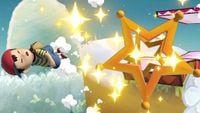
In addition to serving as the basis of Rosalina's up special, the Launch Star from Super Mario Galaxy and Super Mario Galaxy 2 appears as an item in Super Smash Bros. Ultimate, under the name Super Launch Star (though it was referred to as simply a Launch Star in some pre-release material). It can be deployed similarly to a Bumper by picking it up and throwing it, and points horizontally if it is thrown to the left or right, or vertically if it is thrown upwards or downwards. After it is deployed, any fighter who runs into it is automatically launched in the opposite direction it was thrown.
Mario + Rabbids Sparks of Hope[edit]
In Mario + Rabbids Sparks of Hope, a miniature Launch Star appears on a bookshelf in Madame Bwahstrella's cabin at Pristine Peaks.
The Super Mario Galaxy Movie[edit]
This section is referring to a subject in an upcoming or recently released film. When the film is released, or more information about this subject is found, this section may need major rewriting.
This notice should be removed after a month has passed since the film was first released.
In The Super Mario Galaxy Movie, Princess Peach and Toad use a Launch Star to travel into space.
Profiles[edit]
Super Mario Galaxy trading card[edit]
Gallery[edit]
Screenshot of a Launch Star in the Sky Station Galaxy of Super Mario Galaxy 2
Naming[edit]
Internal names[edit]
| Game | File | Name | Meaning
|
|---|---|---|---|
| Super Mario Galaxy Super Mario Galaxy 2 |
ObjectData/SuperSpinDriver.arc | SuperSpinDriver | Super Spin Driver |
| StageData/ObjNameTable.arc/ObjNameTable.tbl SystemData/ObjNameTable.arc/ObjNameTable.tbl |
スーパースピンドライバー (Sūpā Supin Doraibā) |
Names in other languages[edit]
| Language | Name | Meaning | Notes |
|---|---|---|---|
| Japanese | スーパースターリング[?] Sūpā Sutā Ringu |
Super Star Ring | |
| Chinese (Simplified) | 弹射星[?] Tánshè xīng |
Launch Star | Super Mario Galaxy |
| 超级弹射星[?] Chāojí Tánshè Xīng |
Super Launch Star | Super Smash Bros. Ultimate | |
| Chinese (Traditional) | 彈射星環[1] Tánshè Xīng Huán |
Launch Star Ring | Super Mario Galaxy 2 |
| 超級彈射星[?] Chāojí Tánshè Xīng |
Super Launch Star | Super Smash Bros. Ultimate | |
| Dutch | Lanceerster[2] | Launch Star | |
| French | Super anneau étoile[3][4][5] | Super star ring | |
| German | Sternenring[6] | Star Ring | |
| Super-Sternenring[?] | Super Star Ring | Super Smash Bros. Ultimate | |
| Italian | Maxistella Lancio[?] | Maxi Launch Star | Super Mario Galaxy 2 |
| Stella Lancio[?] | Launch Star | Super Mario Galaxy | |
| Korean | 스타링[?] Seuta Ring |
Star Ring | |
| Portuguese (Brazilian) | Astropropulsor[7] | Astro propellant | |
| Portuguese (European) | Estrela-Canhão[8] | Cannon Star | |
| Russian | Пусковая звезда[?] Puskovaya zvezda |
Launch Star | |
| Spanish | Anillo Estelar[?] | Star Ring |
Notes[edit]
- The green Launch Star located on the Comet Observatory in Super Mario Galaxy is the only Launch Star between the two games that is actually inaccessible the first time it is encountered. It can be restored only after Mario has collected all three Green Stars hidden throughout the game.
- When a Launch Star spins, it does not rotate perfectly on its axis, but it rather appears to wobble back and forth slightly while spinning around.
- The Launch Star sound, when launched, synchronizes with the current music. This technique is used with a MIDI data inside the music file.[9]
References[edit]
- ^ 超級瑪利歐銀河2. Nintendo of HK (Traditional Chinese). Retrieved March 16, 2020.
- ^ Official Dutch website for Super Mario Galaxy + Super Mario Galaxy 2 (Nintendo Switch)
- ^ Super Mario Galaxy, Le Guide Officiel. Prima Games, page 110
- ^ Super Mario Galaxy 2, Le Guide Officiel. Prima Games, page 11
- ^ Super Smash Bros. Ultimate French official website, items section
- ^ Nintendo of Europe GmbH (2007). Super Mario Galaxy Spielanleitung. Frankfurt: Nintendo of Europe GmbH (German). Page 20.
- ^ Official Portuguese website for Super Mario Galaxy + Super Mario Galaxy 2 (Nintendo Switch)
- ^ In-game name from Super Smash Bros. for Wii U.
- ^ Volume 3: The Sound Team. Nintendo of America (American English). Retrieved July 13, 2024.
| Mario Tennis Open | ||
|---|---|---|
| Playable characters | Default | Mario • Luigi • Princess Peach • Yoshi • Princess Daisy • Boo • Bowser Jr. • Diddy Kong • Donkey Kong • Waluigi • Wario • Bowser • Mii |
| Unlockable | Luma • Baby Mario • Baby Peach • Dry Bowser | |
| Obtained from QR code | Red Yoshi • Blue Yoshi • Light Blue Yoshi • Yellow Yoshi • Pink Yoshi • Black Yoshi • White Yoshi • Metal Mario | |
| Non-playable characters | Toad • Lakitu • Toads • Goomba • Mechakoopa • Penguin • Shy Guy • Koopa Troopa • Piranha Plant • Inky Piranha Plant • Buzzy Beetle • Koopa Paratroopa | |
| Courts | Mario Stadium • Mushroom Valley • Wario Dunes • DK Jungle • Bowser's Castle • Penguin Iceberg • Peach's Palace • Galaxy Arena | |
| Cups | Mushroom Cup • Flower Cup • Banana Cup • Champions Cup • 1-Up Mushroom Cup • Ice Flower Cup • Shell Cup • Final Cup | |
| Special Games | Ring Shot • Super Mario Tennis • Galaxy Rally • Ink Showdown | |
| Miscellaneous | Emblem • Fan Poll • Gallery • Gear • Multimedia • Staff | |

